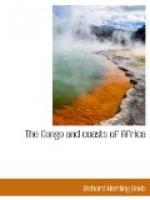Twenty-five years ago all of Africa was divided into many parts. The part which still remained to be distributed among the Powers was that which was watered by the Congo River and its tributaries.
Along the north bank of the Congo River ran the French Congo; the Portuguese owned the lands to the south, and on the east it was shut in by protectorates and colonies of Germany and England. It was, and is, a territory as large, were Spain and Russia omitted, as Europe. Were a map of the Congo laid upon a map of Europe, with the mouth of the Congo River where France and Spain meet at Biarritz, the boundaries of the Congo would reach south to the heel of Italy, to Greece, to Smyrna; east to Constantinople and Odessa; northeast to St. Petersburg and Finland, and northwest to the extreme limits of Scotland. Distances in this country are so enormous, the means of progress so primitive, that many of the Belgian officers with whom I came south and who already had travelled nineteen days from Antwerp, had still, before they reached their posts, to steam, paddle, and walk for three months.
In 1844 to dispose amicably of this great territory, which was much desired by several of the Powers, a conference was held at Berlin. There it was decided to make of the Congo Basin an Independent State, a “free-for-all” country, where every flag could trade with equal right, and with no special tariff or restriction.
The General Act of this conference agreed: “The trade of ALL nations shall enjoy complete freedom.” “No Power which exercises or shall exercise Sovereign rights in the above-mentioned regions shall be allowed to grant therein a monopoly or favor of any kind in matters of trade.” “ALL the Powers exercising Sovereign rights or influence in the afore-said territories bind themselves to watch over the preservation of the native tribes, and to care for the improvement of the condition of their moral and material welfare, and to help in suppressing slavery.” The italics are mine. These quotations from the act are still binding upon the fourteen Powers, including the United States.
For several years previous to the Conference of Berlin, Leopold of Belgium, as a private individual, had shown much interest in the development of the Congo. The opening up of that territory was apparently his hobby. Out of his own pocket he paid for expeditions into the Congo Basin, employed German and English explorers, and protested against the then existing iniquities of the Arabs, who for ivory and slaves raided the Upper Congo. Finally, assisted by many geographical societies, he founded the International Association, to promote “civilization and trade” in Central Africa; and enlisted Henry M. Stanley in this service.




